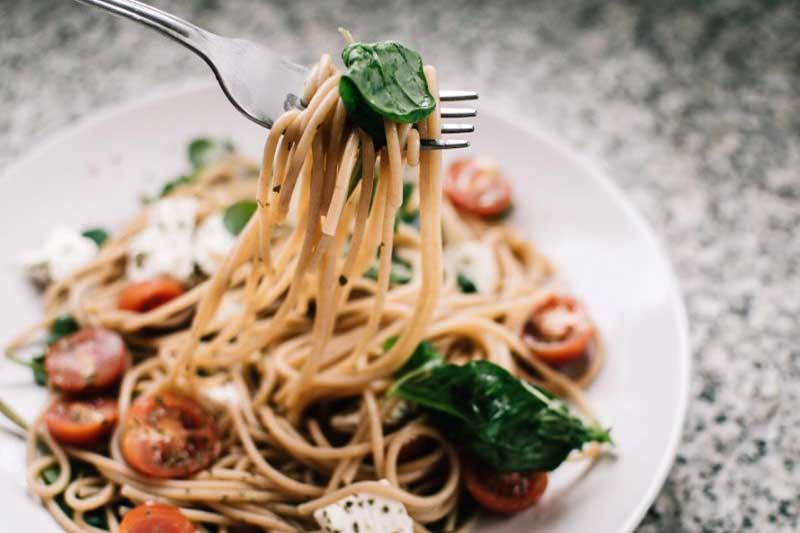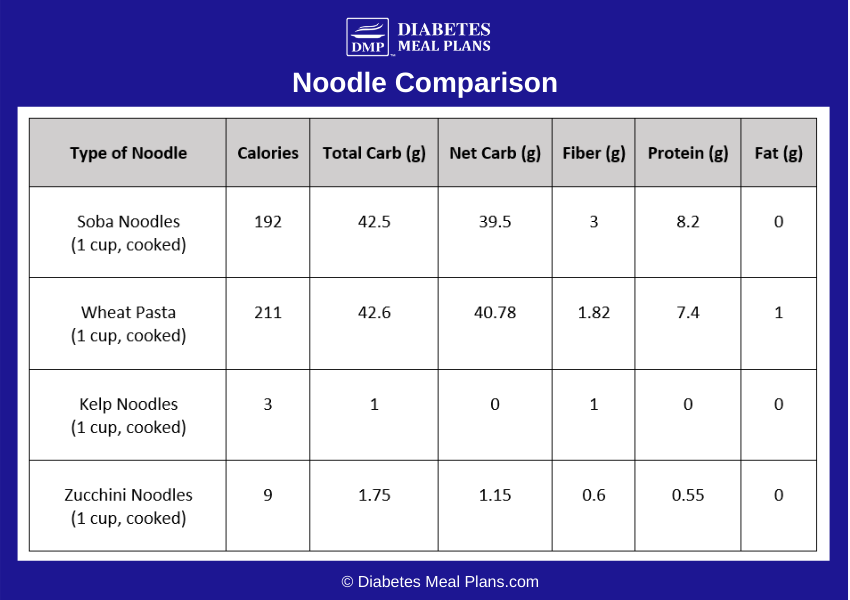Table of Contents[Hide][Show]
There are so many noodle options out there, but do soba noodles (made from buckwheat) make the cut when it comes to blood sugar control in type 2 diabetes?
Keep reading and we’ll talk nutrition, research, and which kinds of noodles are best for blood sugar management.

What are Soba Noodles?
Soba noodles are thin noodles made from buckwheat flour. These noodles originated in Japan and are often served chilled with a sauce or as a hot noodle soup.
Authentic soba noodles are made of just buckwheat and water.
Buckwheat is a grain-like seed that actually doesn’t contain any wheat at all so it can be used by those who follow a wheat-free or gluten-free diet. However, a lot of varieties of soba noodles you may find at the grocery store contain additional wheat flour, so make sure to check your labels if that’s a concern.
Soba Noodles Nutrition Facts

When we look at the top half of the nutrition table, we see one predominant thing – lots of carbs!
While soba noodles do offer protein and fiber along with some vitamins and minerals such as magnesium, phosphorus, thiamin, and manganese – the amount of carbohydrates per serving is way too high for someone with pre-diabetes or diabetes.
Yes, the buckwheat in soba noodles is a “whole grain,” so at first you may have been thinking it’s a good option to eat. It’s true that compared to “white” noodles, a whole grain is a better choice. But while we may hear a lot about the benefits of whole grains in the media, research shows us that eating whole grains does nothing to help blood sugar and A1c levels in those with diabetes.
Now, that doesn’t mean you can never eat whole grains, but eating whole grains will not improve your blood sugar levels if you have diabetes.
Compared to wheat pasta, soba noodles do have fewer carbs and more fiber, but this difference is minimal. Buckwheat does have a better amino acid profile compared to other grains, but we are focusing on the carbohydrate content since that is what impacts blood sugar the most.
Overall, because soba noodles are a higher carb food we do not encourage them as part of the low carb diet that we recommend for those with pre-diabetes and diabetes.
If you want to consume soba noodles you must focus on the portion size. If you keep your portion to no more than half a cup of cooked soba noodles you would still be getting close to 20 grams of carbohydrates.
Even with the small portion, this is still not a low-carb food! You could eat 4 cups of broccoli for around the same amount of carbs and you would also get more than double the fiber.
Additionally, look at the ingredients when purchasing soba noodles. As mentioned earlier, a lot of varieties contain added wheat flour, which will change the carbohydrate content, most often raising it.
When it comes to pasta, the best option is to skip the grain-based pastas altogether and give low-to-no carb options like kelp noodles or zucchini noodles a try. As you can see from the chart above, they are a way better option for blood sugar control because they contain so few carbs!

Research on Soba Noodles and Diabetes
Since soba noodles are made from buckwheat, let’s look at the research on buckwheat and how it may impact those with diabetes.
Overall, most of the studies on buckwheat and diabetes show a preventative benefit. Meaning, if one doesn’t have diabetes, consuming moderate amounts of buckwheat may lower your risk for getting diabetes.
Studies suggest that the bioactive compounds in buckwheat such as d-chiro-inositol and flavonoids may be partially responsible for the observed preventative effects.
D-chiro-inositol is a vitamin-like substance found in a variety of plant and animal foods and can influence the action of insulin. Flavonoids are naturally occurring plant pigments found in fruits and vegetables and provide numerous health benefits.
Another study, involving 165 participants with type 2 diabetes, wanted to see if replacing a staple food consumed daily with buckwheat would improve risk factors of type 2 diabetes, including fasting glucose and insulin resistance.
The results showed that the group that consumed buckwheat did have decreased insulin, but no significant differences in blood glucose and A1c were observed between the two groups. If buckwheat consumption went above 110g/day (little ½ cup), greater insulin resistance was seen.
The point being, buckwheat may be a healthy food for a generally healthy person who does not already have diabetes or prediabetes.
However, the research on treating type 2 diabetes with buckwheat is pretty underwhelming. That’s because we know that high carbohydrate foods increase blood sugar and A1c, not the other way around.
When grain-like cereal such as buckwheat and quinoa were consumed for breakfast and lunch participants saw lower glucose levels compared to consuming white bread. Well, that is not surprising at all! Most whole grains will give you a better glucose response compared to white bread.
So although buckwheat showed better glucose response compared white bread, that doesn’t mean it is a good choice to get your blood sugars under control.
Conclusion
Soba noodles are a high carb noodle made from the whole grain buckwheat. The consumption of soba noodles for those that have diabetes must be carefully considered.
Granted everyone is different when it comes to their carbohydrate ‘sweet spot,’ but we’ve found most individuals do well staying between 50-80 grams of total carbs per day, or up to a maximum of 100g.
Remember, 1 cup of soba noodles has ~42 grams of carbs, so you pretty much blow most of your carb allowance on one measly cup of noodles.
Although research on buckwheat shows a potential benefit from a preventative standpoint, there is little evidence to support that its consumption will help treat elevated blood glucose levels. On the other hand, there is a mountain of research supporting a lower carb diet to treat diabetes.
There are so many other foods to consume without the high carbohydrate content, and low-carb noodle alternatives can be just as tasty are normal pasta (minus all those pesky carbs) don’t be afraid to think outside the box when planning your next meal!

Leave a Reply